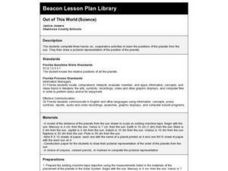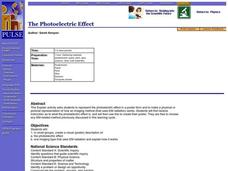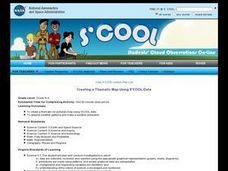Curated OER
Galaxy Adventure
Working in groups, learners create a mnemonic device, give an oral presentation, and create a pictorial representation of the correct sequence of the planets and asteroid belt from the sun. An assessment rubric is included in the lesson.
Curated OER
Out of This World (Science)
Students participate in various hands-on activities to visually demonstrate the positions of the planets from the sun. Then they draw a pictorial representation of the order of planets from the sun.
Curated OER
Animals Active at Night
Students identify animals that are active at night and the reasons why. They examine the features needed to be a nocturnal animal. They create a representation of one of the animals.
Curated OER
Where Do I Go At Night?
Students describe the requirements of daytime and nightime animals for survival. They identify any behaviors that assist in the animal surviving. They create a representation for the class to view.
Curated OER
Introduction to the Elements of the Water Cycle
The basic elements of the water cycle and how water is recycled through our environment is focused on in this lesson. Your students construct classroom terrariums and learn to make and record observations relating to the water cycle....
Alabama Learning Exchange
Yummy Apples!
Young learners listen to a read aloud of Gail Gibbons book, Apples and the story A Red House With No Windows and No Doors. They compare characteristics of a number of kinds of apples, graph them and create a apple print picture. Learners...
Intel
Cell-to-Cell
The third in a series of 10 STEM project-based lessons focuses on cells types, functions, and physiology. Through research, discussions, writings, and presentations, groups learn about the difference between plant and animal cells, the...
Curated OER
The Photoelectric Effect
After some online instruction, chemistry aces use their creative abilities to produce a poster describing the photoelectric effect and one type of imaging technology that uses electromagnetic radiation. This simple, straightforward...
Curated OER
Are We Couch Potatoes or Busy Bees? Data Analysis of Physical Activity in School
Young scholars study practical data analysis within the constraints of the scientific method. In this data lesson plan students collect and enter data into a computer spreadsheet then create graphs.
Curated OER
How Much Salt is in the Gsl Water?
Fourth graders study the water cycle and the different processes that are involved, like precipitation, evaporation, etc. They conduct an experiment observing the water cycle in action and write a hypothesis, observations and...
University of Minnesota
Virtual Neurons
It's electric! Young anatomists use Virtual Neurons software to build, control, and analyze complex nerve circuits within the body. Colorful and packed with content, class members enjoy interacting with the nervous system at a personal...
Curated OER
Sustainable Southern Belize: Coral Health Lesson Plan
Fifth graders investigate coral reefs and the dangers they face by labeling and drawing. In this oceanography lesson plan, 5th graders view a PowerPoint presentation of photographs of coral reefs in Belize. Students investigate and...
Curated OER
Earth Science: The Structure of the Earth
Students identify and complete activities about the structure of the Earth. For this Earth structure lesson, students view a Powerpoint about the Earth's layers and complete a diagram. students compare temperatures in the Earth's layers...
Curated OER
Volcano Demonstration
Students watch a demonstration on how volcanoes work. In this volcano demonstration, students watch the teacher demonstrate a volcanic eruption. The teacher will change variables used to create the eruption and the students will predict...
Curated OER
Please Turn Up the Lights!
Eighth graders discuss series and parallel circuits and design an investigation to test a hypothesis on total resistance of series and parallel circuits in combination. After discussion, groups design their experiments, run tests, and...
Curated OER
Fast Food Survey Using Bar Graphs
Second graders create a bar graph to pictorically represent the data collected from a survey of students. They use Excel to electronically create the graphs and data tallies. They then interpret their data using sentences to explain.
Curated OER
Jumping Frogs
Students create a jumping frog out of construction paper, close pins and pipe cleaners. They predict how far they think their frog jump and then test it out to see how close or far away they were from their prediction.
Curated OER
Creating your Frog's Environment
Students discuss where frogs can live. After the discussion, they create an environment for a frog using items of their choice. Some may include: construction paper, paint, magazines. The environment could even be 3-D. The key to this...
Curated OER
What’s That, I Can’t Hear You?
Students investigate forms of energy as well as light and sound. In this science lesson, students participate in hands-on activities that require them to evaluate how sound affects astronauts in flight. A video of this lesson being...
Curated OER
Look Ma! I'm a Rocket Scientist!
Students use a ball to push and pull to demonstrate the concept of force. In this force lesson plan, students talk about the importance of force in space and use balls to demonstrate this phenomena.
Curated OER
Cell Cycle Duration
Learners examine the cell cycle and how its duration can vary. In this cells lesson students complete a worksheet and answer questions.
Curated OER
Creating a Thematic Map Using S'COOL Data
Students observe weather patterns, collect data, and make a weather predictions for various locations on a map.
Curated OER
Sugar Bush Sap Production - Human Environmental Impact on Sap Sand
Eleventh graders compare the amount of sugar sand present in tree sap. In this environmental science lesson plan, 11th graders measure different tree circumference. They prepare a report and share findings in class.
Web Elements
Web Elements Periodic Table: Atomic Radius
This Webelements website provides a short but detailed definition of atomic radius. Includes links to other chemistry sites.

























